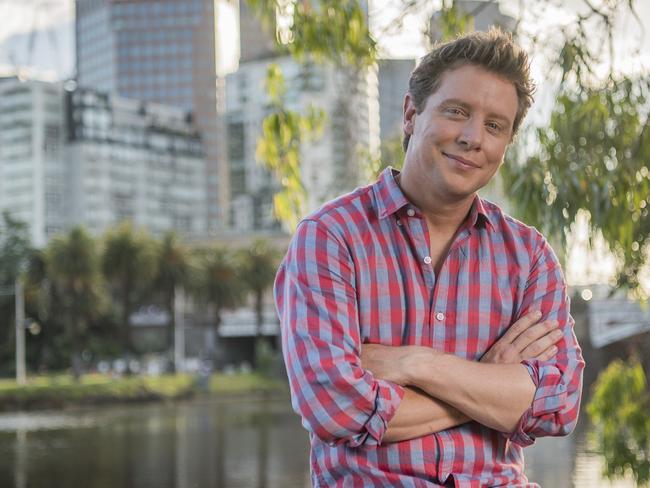Barefoot Investor: Long-term financial security doesn’t come from a short-term getaway fund
SCOTT Pape had to Google the fetish of ‘financial domination’ to respond to what was easily the wildest question the Barefoot Investor has had this year.
Barefoot Investor
Don't miss out on the headlines from Barefoot Investor. Followed categories will be added to My News.
BAREFOOT Investor Scott Pape had to Google financial domination to respond to what was easily the wildest question he’s had in 2018.
BARBARA ASKS: I am 24 and do financial domination on the side, out of my normal working hours. Income goes into my account for this, which is mostly gifts, the rest as payment for videos.
I am doing pretty well — by the end of this financial year I think I will have doubled my income.
But I am scared no one will talk to me seriously about this. My real question is, should I have an ABN set up, or continue as normal and add it to my tax return?

BAREFOOT REPLIES:
First, yours is easily the wildest question I’ve had in 2018. Well done. Second, I’ll admit that I actually had to google “financial domination”.
Here’s how the interwebs describe it: “The fetish of financial domination basically entails men transferring large sums of money to financial dominatrixes over the internet.
The nuances vary, but a relationship can stretch anywhere from a man sending his dominatrix $30 a week, to donating the vast majority of his earnings and having his dominatrix take full control of all his finances.”
Finally, I’ll answer your question, which might I add, is relevant to anyone doing a side hustle and earning an income.
You say that “no one will talk to me seriously”, but I can assure you the tax office most certainly will.
One way to become more legit is to go to the Australian Business Register (abr.gov.au) and apply for an Australian Business Number (ABN). It doesn’t cost anything, and you’ll get it immediately. It’ll also help should you want to register your business name, help you with the ID to get a bank account, and if you ever want to issue an invoice, you’ll be able to quote your ABN number and not get hit with withholding tax.
Still, you don’t need to worry about GST until you’re turning over at least $75,000 a year. Until that point you can run the business as a sole trader and simply report the income in your individual tax return, using the section for “business items” to show your income and expenses.

Should couples keep their cash separate?
I WAS at a book signing recently, when a woman in her 40s leaned in and said to me: “The women at my work absolutely love your book … but there’s one part that we all disagree with you on.”
“Go on,” I said, scribbling in her book.
“Well, you say that married couples should share their money. But women need to have some independence and have access to their own money … just in case,” she said.
Fair enough.
Sharing money isn’t right for every couple — especially those who are not in long-term committed relationships, or those who are on their second time around with substantial assets.
However, the feedback from couples who are following the Barefoot Steps suggests it works.
Let me explain.
Before we were married, Liz and I followed the old “de facto dutch-o” routine and kept pretty much everything separate. Honestly, it was a pain in the rump.
We each kept a mental spreadsheet of who paid for what, but it would inevitably cause a barney, because our incomes were different and therefore our spending was out of whack.
That all changed when we got engaged.
At the time Liz was pregnant (scandal!), so we knew she’d be taking time off work — and that’s a potentially vulnerable situation for a woman to be in.
So I took her out to the Romsey pub for our very first Barefoot Date Night (nothing but the finest cuisine for my fiancee), and sketched out our simple three-bucket money management plan on the back of a serviette.

See, no one wants to be controlled in a relationship. No one wants their partner questioning everything they spend their money on.
And that’s why the centrepiece of our plan is the rule that we can each spend $400 on anything we choose — no need to ask for permission. Anything over that we talk about and make a joint decision.
My view is that long-term financial security doesn’t come from having a short-term getaway fund.
Rather, it comes from doing the Barefoot Date Nights with your partner, and working together on your financial goals.
Tread Your Own Path!

GETTING IT SHIPSHAPE
MARY ASKS: Last August my husband bought a boat without telling me, and put it all on finance.
After wanting to throw him to the sharks, I have come to terms with this liability (B.O.A.T. — Bring On Another Thousand).
We are both 47 and earn $150,000 combined. I bought him your book for Christmas and finally we are on the same page as far as money goes.
It is a five-year loan at 8.97 per cent (total cost $37,000). My question is, would it be worth rolling it into the home loan and pay extra on the mortgage?
Our mortgage rate is 3.99 per cent, and the penalty to pay the boat out early is $400.
BAREFOOT REPLIES: That’s really … strange.
“Hi Honey, I’m home! On the way back from the fish ’n’ chip shop I picked up a $30k boat!”
Anyway, the answer to your question is yes, you should roll the boat debt over to your mortgage.
However, you need to understand that you’re taking a fixed-term five-year loan and spreading it over a 30-year mortgage, which means you’ll pay less per month but will end up paying a lot more in the end!
So, a word of advice: if your husband comes back from the shops with a jet ski, you need to grab him by the fishing tackle and reel him in quick. Keep him on the hook, Mary.

LIVE AND LEARN
JOHN ASKS: Twelve months ago my wife and I separated, so I am now “starting again”.
We have nine children, and my eldest son has asked me to go guarantor, or have a joint loan, so he can consolidate his $55,000 credit card debt.
He also has two personal loans amounting to about $70,000. He earns about $120,000 a year, and I earn about $100,000 myself.
I gave him your book for Christmas but I fear it is not enough. His situation is crushing — what can I do?
BAREFOOT REPLIES: You have nine kids?
That’s very impressive. I have 66 per cent fewer kids than you, and my life resembles the Teletubbies.
Now, with nine kids you’re in danger of setting a very expensive precedent by bailing out your eldest.
Even if you could afford it, I still wouldn’t recommend it. Your son is in desperate need of a life lesson, and if you go the hook for him you’re denying him that opportunity (at best) and screwing yourself financially (at worst).

It takes a lot of guts for a parent to sit back and let their children learn from their experiences. Be courageous.
Besides, your son’s problem isn’t the interest rates he’s paying — that’s merely the symptom. His problem is that he has out-of- control spending. The sooner (and more brutally) he works that out, the sooner he’ll start behaving like an adult, take responsibility for his actions, and move forward.
There are no magic wands, but all the answers he needs are waiting for him in the book you’ve already given him.
The Barefoot Investor holds an Australian Financial Services Licence (302081). This is general advice only. It should not replace individual, independent, personal financial advice
Originally published as Barefoot Investor: Long-term financial security doesn’t come from a short-term getaway fund


